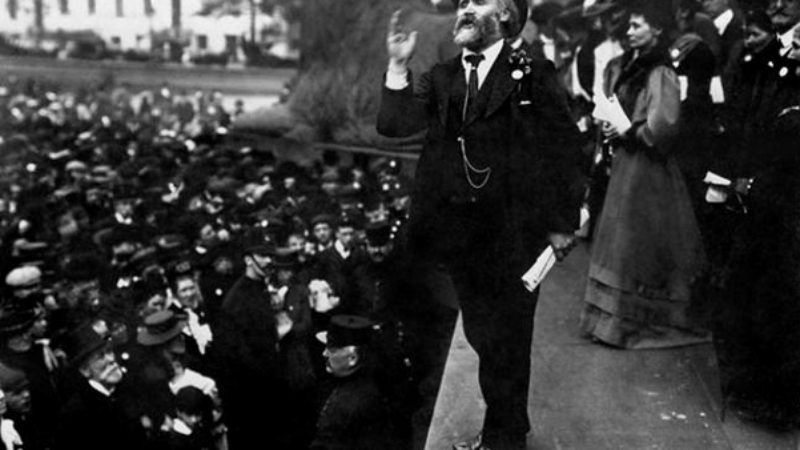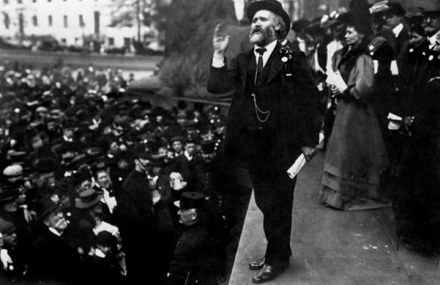
To commemorate the 100th anniversary of the passing of Labour’s first leader Keir Hardie today, LabourList is publishing a series of Hardie’s writings, introduced by Blair McDougall.

Hardie became very close to the Pankhurst’s (almost certainly having a romantic affair with Sylvia Pankhurst) and was inspired to throw himself into the cause of women’s suffrage. He was inevitably a speaker at the major demonstrations in favour of votes for women. His zeal for the cause alienated him from his comrades. He even threatened to leave the Labour Party which he had founded in order to vote his conscience on the issue after the party adopted a position which would only support women’s votes alongside moves for full adult suffrage.
In 1905 he wrote at length about his convictions that giving women the vote was key to improving their position in society, and the good of society as a whole. His language and outlook is of his age, but his passion for women’s equality is timeless.
From The Citizenship of Women: A Plea for Woman’s Suffrage, 1905.
No one seeks to deny the existence of differences between the sexes, differences subtle, deep seated, and ineradicable. But these, being admitted, afford no justification for the usurpation by man of the right to say what duties and responsibilities woman may be allowed to undertake, and what must be withheld from her because of her sex. Such a theory can only be upheld on the old tradition of the East that woman is one of the lower animals over whom lordly man was given dominion. The harem is the logical outcome of this belief. It is only by removing the disabilities and restraints imposed upon woman; and permitting her to enter freely into competition with man in every sphere of human activity, that her true position and function in the economy of life will ultimately be settled. We can at present form no conception of what woman is capable of being, or doing. We have no data upon which to base any real conclusions. Nowhere is woman treated as the free and equal companion of man…
A woman, for the purposes of citizenship, has no legal existence in England, and has to be created before she can be enfranchised. To the uninitiated this may appear absurd and ridiculous, but it the plain, unvarnished truth none the less. A woman may be a criminal, a queen, a tax and rate payer and owner of property, but she may not be a citizen of Great Britain and Ireland until a right to become such has been created by Act of Parliament…
…To those who are opposed on principle to women having the vote at all I have little to say. These I find it easier to pity than to reason with. But when they foresee the deluge following upon the enfranchisement of women, I refer them to the Colonies. There women are citizens and voters, but they have not because of that ceased to be wives—even housewives, or mothers. Their outlook on life has been a little broadened by the possession of the vote which, willy nilly, forces them to interest themselves somewhat in political and social questions. They are thus in a fair way to become better companions to their husbands, and—and I say this with deep conviction—better mothers. Women whose circle of interests is circumscribed by her pots, pans, and scrubbing brushes, varied by an occasional gossip with a neighbour or quarrel with her husband, can never, however affectionate, be other than a curb upon the opening, eagerly questioning intelligence of her children. Broaden the outlook of the mother, and you open a new world for childhood to grow in, and bind many a wild, wayward youth to his home-life who is now driven out into the hard world for lack of that sympathetic, intelligent companionship which an educated and enlightened mother can alone supply. Colonial statesmen and social reformers all admit that woman’s influence in the sphere of politics has been healthy and quickening, and, as it has been there, so undoubtedly would it be here.
The “half angel, half idiot” period is over in the woman’s world. She is fighting her way into every sphere of human activity. Her labour is coming into competition with that of man in nearly every department of industry. In the learned professions she is forcing herself to the front by sheer determination and force of intellect in a way that will not be denied. Sooner or later men will be compelled to treat with her and recognize her as a co-worker, and they could not begin better than by admitting her right to be a co-voter. Those who prate so glibly of adult suffrage might surely learn something of men’s opinion of women by taking note of the way in which lawyers and doctors are resisting her encroachments upon their preserves. A woman may be Queen of England, but she may not enter the profession from which Lord Chancellors are drawn.
The enfranchisement of women is not a party question. Its supporters and opponents are distributed over all parties. The measure is again coming well within the sphere of practical politics, and it is for women to see that it is kept there until a settlement is reached. If they will, as I think they should, make it not a test but the test question at elections, and resolutely refuse to work for, or in any way countenance any candidate who is not whole-heartedly with them, they will, if not in this Parliament, then certainly in the next, secure the passage of a measure through the House of Common’s at least, which will place them on terms of political equality with men. If this comes as part of a measure for giving complete adult suffrage, well and good; but political equality they should insist upon, whatever the conditions of that equality may be.




More from LabourList
‘The cost of living crisis is still Britain’s defining political challenge’
‘Nurses are finally getting the recognition they deserve’
Letters to the Editor – week ending 15th February 2026